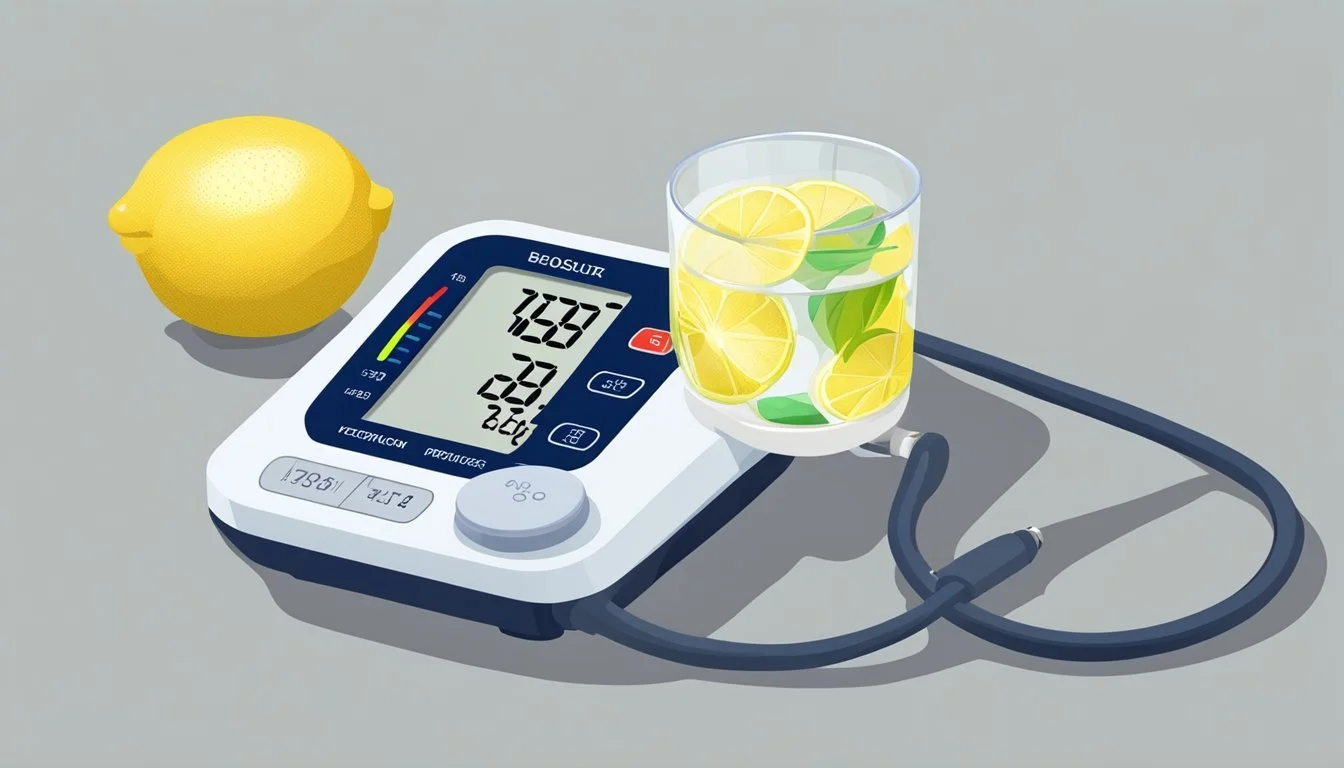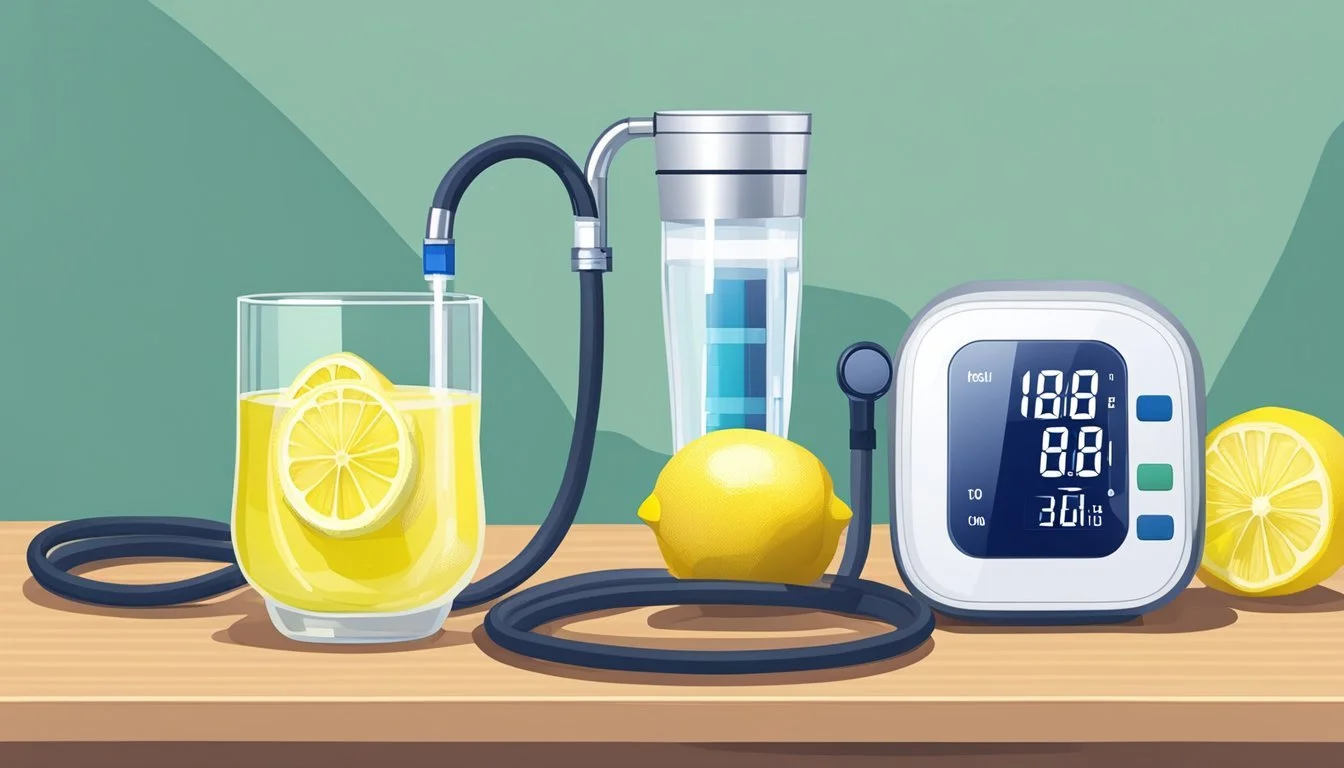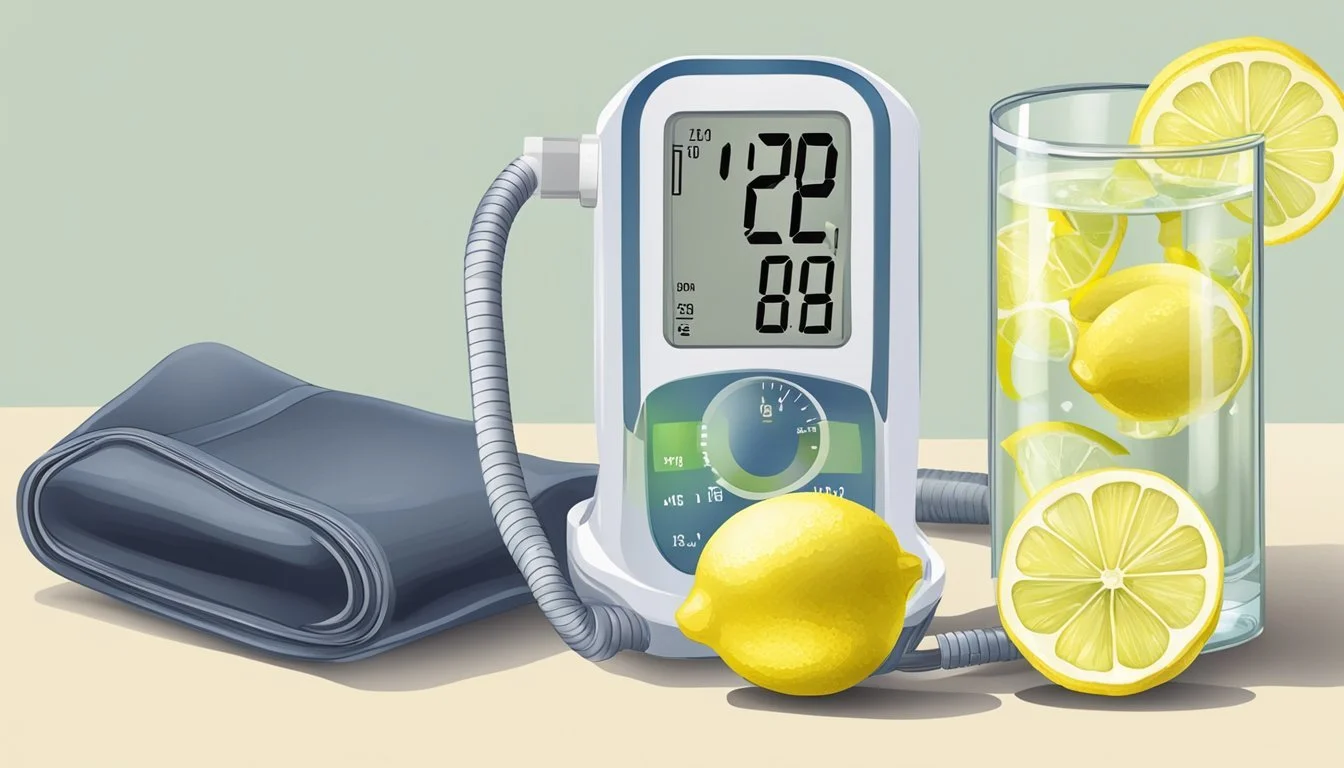Can Drinking Lemon Water Help Lower Blood Pressure?
Unveiling the Truth About This Citrus Remedy
Drinking lemon water has gained popularity for its potential health benefits, among which is the regulation of blood pressure. Hypertension, or high blood pressure, carries risks of serious health issues and affects a significant portion of the population. Some evidence suggests that incorporating lemon water into one's daily routine can contribute to lowering blood pressure. Lemons, along with their peel, contain compounds that may have a beneficial effect on blood pressure levels. Moreover, the ritual of starting the day with a glass of lemon water could be a simple lifestyle practice to support cardiovascular health.
Lemon water, a simple combination of lemon juice and water, could have a role in reducing blood pressure due to the properties of the fruit. Lemons are rich in vitamin C and contain various other nutrients and antioxidants that may work together to support healthy blood pressure. Also, lemons are a source of potassium, a mineral essential for managing the balance of fluids in the body and normal functioning of blood vessels.
Although drinking lemon water may be useful for blood pressure control, it is not a standalone solution and should be considered part of a broader approach to maintaining a healthy blood pressure. Diet and lifestyle factors, such as reduced sodium intake, regular physical activity, and moderation in alcohol consumption, also play critical roles. Therefore, while lemon water can be a refreshing and healthy addition to one's diet, it should accompany other proven strategies for blood pressure management.
Understanding Blood Pressure
Blood pressure refers to the force exerted by circulating blood against the walls of the body's arteries, the largest blood vessels. It is a vital sign and an indication of heart health. Blood pressure readings are given as two numbers: systolic and diastolic. The systolic blood pressure is the pressure when the heart beats while pumping blood; the diastolic blood pressure measures the pressure when the heart is at rest between beats.
Systolic Blood Pressure: Indicates how much pressure blood is exerting against artery walls when the heart beats.
Diastolic Blood Pressure: Reflects the pressure in the arteries when the heart rests between beats.
A normal blood pressure level is less than 120/80 mmHg. Here are the categories for blood pressure levels in adults:
Category Systolic (mm Hg) Diastolic (mm Hg) Normal <120 <80 Elevated 120-129 <80 Hypertension Stage 1 130-139 80-89 Hypertension Stage 2 ≥140 ≥90 Hypertensive Crisis >180 >120
High blood pressure, also known as hypertension, can lead to health issues such as heart disease and stroke. It is often called the "silent killer" because it may have no symptoms. Managing blood pressure is crucial for maintaining heart health and reducing the risk of these severe consequences. Regular monitoring can help to detect changes early on, allowing for timely intervention and management.
The Role of Diet in Managing Blood Pressure
Diet plays a crucial role in the management of blood pressure, where specific nutrients impact blood pressure levels, and certain foods are advisable to avoid to maintain cardiovascular health.
Importance of Nutrients
Potassium: A key mineral in blood pressure regulation, potassium aids in the expulsion of sodium through urine and eases tension in the blood vessel walls. Foods rich in potassium include bananas and citrus fruits like oranges and lemons.
Magnesium: This mineral helps to relax blood vessels, and can be found in foods such as leafy greens, whole grains, and nuts.
Vitamin C: Associated with a potential reduction in systolic blood pressure, vitamin C is abundant in citrus fruits, including lemons.
Calcium: Adequate calcium is important for blood vessel contraction and relaxation. Dairy products, fortified plant-based milks, and leafy greens provide calcium.
Fiber: A diet high in fiber can help reduce blood pressure and improve cholesterol levels, as found in fruits, vegetables, and whole grains.
Foods to Avoid
Sodium: High sodium intake is linked with increased blood pressure. It's advisable to limit foods high in sodium, such as processed foods, cured meats, and canned soups.
Excessive Fat and Cholesterol: Saturated fats and trans fats can contribute to the build-up of arterial plaque, increasing blood pressure. They are commonly found in fatty cuts of meat, full-fat dairy products, and fried foods.
Added Sugars: Excess sugar intake, particularly from sugary drinks and sweets, can lead to weight gain and increased blood pressure.
It's essential to consider both what to include and what to limit in a diet to manage blood pressure effectively. Nutrient-rich, whole foods contribute to a healthy blood pressure, while processed foods high in sodium, unhealthy fats, and sugars should be consumed in moderation.
Lemon Water and Its Components
Lemon water is a simple drink made by mixing freshly squeezed lemon juice with water, and it may possess health benefits linked to its constituent nutrients.
Nutritional Benefits of Lemons
Lemons are a rich source of vitamin C, an essential antioxidant that supports the immune system and skin health. They also contain a variety of minerals, such as potassium, which is vital for heart health and regulating blood pressure. Lemons offer an array of other beneficial compounds including citric acid, known for its ability to enhance nutrient absorption, and flavonoids, which have been associated with reductions in blood pressure. Below is a breakdown of the key nutrients found in lemons:
Vitamin C: Approximately 21.6 mg in the juice of one lemon [1]
Potassium: Essential for muscle function and nerve transmission
Fiber: Specifically pectin, which is found in the pulp and peel
Citric Acid: May prevent kidney stones and improve nutrient absorption
However, when lemons are turned into lemon water, the concentration of these nutrients is diluted. To benefit from the dietary fiber found in lemons, one must consume the pulp.
Lemon Water Preparation
To prepare lemon water, simply squeeze the juice from half a lemon into a glass of water. For a full nutritional benefit, include the pulp. This can be served warm or cold based on personal preference. The citric acid and flavonoids in the lemon juice mix with the water, potentially creating a beverage with health-promoting properties.
Here's a basic guideline for making lemon water:
Squeeze half a lemon into a glass of water, approximately 8 ounces.
Include the pulp if you wish to add fiber to your drink.
Optionally, warm the water prior to adding the lemon juice.
Remember that while lemons and lemon water can contribute to a healthy diet, they should be part of a balanced intake of fruits and vegetables.
Health Benefits of Lemon Water
Lemon water, a simple infusion of lemon juice with water, is acclaimed for providing a myriad of health benefits. From aiding digestion to potentially lowering blood pressure, it serves as a multi-benefit drink. Below are specific health perks that one can expect from incorporating lemon water into their daily routine.
Digestive Health
Lemon water is often consumed to promote digestive health. The citric acid found in lemons may stimulate saliva and gastric juice production, which helps in the digestion of food. Regular consumption can lead to an improvement in gastrointestinal function and may alleviate common digestive issues.
Weight Management
Consuming lemon water might contribute to weight management efforts. It can increase feelings of fullness, which may help to reduce overeating. Additionally, replacing sugary drinks with lemon water reduces calorie intake, potentially aiding in weight loss.
Hydration and Heart Health
Adequate hydration is crucial for overall health, and drinking lemon water can help individuals meet their daily water intake needs. Furthermore, lemons contain potassium, which is essential for heart health, potentially having a beneficial effect on blood pressure regulation.
Skin Health
Lemon water’s vitamin C content is beneficial for skin health. Vitamin C is an antioxidant that helps in neutralizing free radicals and may contribute to reducing skin aging signs. Hydration from water itself is also vital for maintaining healthy, hydrated skin.
Immune System Support
The vitamin C in lemon water supports the immune system. This essential nutrient aids in the body's defense mechanism against infections and promotes overall health. Regular consumption might contribute to a stronger immune response.
Lemon Water's Effect on Blood Pressure
Lemon water has gained attention for its potential benefits for managing high blood pressure. The natural constituents of lemons may play a role in supporting cardiovascular health.
Vitamin C and flavonoids, both antioxidants found in lemons, are key players in their health profile. These antioxidants help protect against oxidative stress, which has been linked to a variety of heart conditions, including high blood pressure. Oxidation of cholesterol is one detrimental process that can lead to the narrowing of blood vessels. The antioxidants in lemon may help prevent this narrowing, facilitating better blood flow and potentially reducing blood pressure.
Additionally, lemons contain minerals like potassium, calcium, and magnesium. Each of these plays a crucial role in the cardiovascular system:
Potassium: Helps relax blood vessel walls, which can lead to lower blood pressure.
Magnesium: Associated with better heart health and regulation of blood pressure.
Calcium: Vital for smooth muscle function, which is found in arteries and can influence blood pressure control.
While these effects suggest a positive impact, it is important to consider the whole diet and lifestyle for managing blood pressure. Drinking lemon water can be part of a healthy diet but should not replace medical treatments if prescribed.
It's worth noting that while these associations exist, direct clinical evidence linking lemon water alone to significant blood pressure reduction is still limited. Therefore, while incorporating lemon water may contribute to overall heart health, one should not rely on it as the sole method of controlling blood pressure.
Exercise and Blood Pressure Regulation
Regular exercise is a critical component in maintaining heart health and managing blood pressure. It helps strengthen the heart and improves circulation, reducing the pressure on arterial walls.
Benefits of Regular Physical Activity
Strengthening the Heart: Engaging in regular physical activity makes the heart stronger, enabling it to pump blood with less effort. This efficiency reduces the force on the arteries, thereby lowering blood pressure.
Enhancing Circulation: Consistent exercise enhances vascular health, improving the body's ability to circulate blood efficiently.
Weight Management: Being physically active is instrumental in maintaining a healthy weight, which is a key factor in preventing and managing hypertension.
Exercise Recommendations
Aerobic Activities: Adults should aim for at least 150 minutes of moderate-intensity aerobic activity per week, such as brisk walking or cycling.
Muscle-Strengthening: Activities that strengthen muscle should be done on two or more days per week.
Consistency: It's important to spread physical activity throughout the week and not just engage in sporadic, intense workouts.
Regular exercise is a cornerstone of heart health and is effective in blood pressure regulation.
Potential Side Effects and Considerations
While lemon water is often considered a healthy beverage that may contribute to lowering blood pressure, it's essential to acknowledge possible side effects and interactions. This section addresses these concerns to ensure informed choices.
Interactions with Medications
Lemon water can influence the efficacy of certain medications. Specifically, its high vitamin C content can interfere with drugs that affect the blood's coagulation process, such as anticoagulants. It may also alter the absorption rate of various medicines, including antibiotics and calcium channel blockers used for managing blood pressure. It's advisable for individuals on medication to consult with a healthcare provider about potential interactions.
Citrus Allergies and Side Effects
Some individuals may experience allergic reactions to citrus fruits. These reactions can range from mild to severe and might include symptoms such as hives, itching, or gastrointestinal distress. Additionally, the citric acid present in lemons may erode tooth enamel over time, a side effect that can be mitigated by drinking through a straw. As with any dietary change, moderation is key, and it is prudent to monitor for any adverse reactions when incorporating lemon water into one's diet.
Comparing Lemon Water to Other Drinks
When exploring the impact of lemon water on blood pressure, it is insightful to examine how it compares with other beverages commonly consumed.
Tea and Coffee
Tea and coffee are among the most popular drinks worldwide. Green tea, specifically, may be beneficial for blood pressure due to its rich content of catechins and polyphenols. Studies suggest that regular consumption can result in moderate blood pressure reductions. Coffee, on the other hand, generally has a temporary elevating effect on blood pressure due to its caffeine content, which might not be ideal for those with hypertension.
Soda and Energy Drinks
Soda and energy drinks often contain high levels of sugar and caffeine, both of which can contribute to an increase in blood pressure. They typically lack nutritional benefits and are not recommended for those looking to manage their blood pressure. Moreover, the diuretic effect of caffeine in energy drinks can lead to dehydration, which is counterproductive when trying to maintain healthy blood pressure levels.
Alcohol
Moderate alcohol consumption has been associated with potential heart benefits. However, excessive alcohol intake can lead to elevated blood pressure, weight gain, and other health issues. The relationship between alcohol and blood pressure is dose-dependent, with lower consumption linked to neutral or slightly beneficial effects and higher consumption leading to harmful impacts on blood pressure.
Lifestyle and Dietary Adjustments
Incorporating lemon water into one's diet may contribute to lowering blood pressure, but it is most effective when part of broader lifestyle and dietary adjustments. This includes focusing on the following areas:
Dietary Fiber: A diet high in fiber can improve heart health. Foods like fruits, vegetables, and whole grains should be regular components of meals.
Weight Loss: Maintaining a healthy weight is essential for blood pressure management. Lemon water can aid hydration and fullness, potentially supporting weight loss efforts.
Cholesterol Levels: High fiber intake also helps in managing cholesterol levels, further protecting cardiovascular health.
Detox: While the term 'detox' is often misused, staying hydrated with drinks like lemon water supports kidney function, indirectly aiding the body’s natural detoxifying processes.
Drinks: Substitute sugary beverages with lemon-infused water to reduce calorie intake and promote better hydration.
Smoking: Smoking cessation is crucial as it immediately benefits blood pressure levels and overall heart health.
Daily Walking: Moderate, regular physical activity such as daily walks can considerably improve blood pressure and cardiovascular health.
Aim for balance and moderation in dietary habits; for example, limit sodium and unhealthy fats. Taken together, these adjustments create a supportive environment for heart health and blood pressure management.






